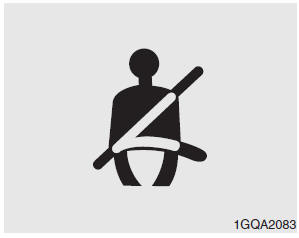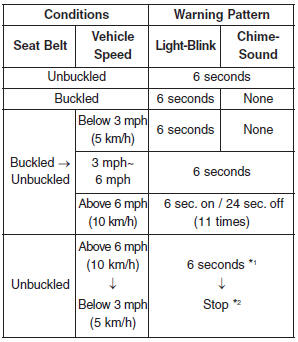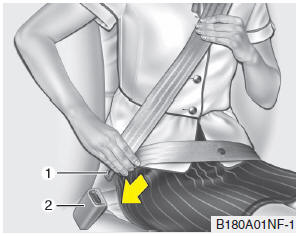 Hyundai Veloster: Seat belt restraint system
Hyundai Veloster 2011-2017 Owner's Manual / Safety features of your vehicle / Seat belts / Seat belt restraint system
Hyundai Veloster: Seat belt restraint system
Hyundai Veloster 2011-2017 Owner's Manual / Safety features of your vehicle / Seat belts / Seat belt restraint system
WARNING
- • For maximum restraint system protection, the seat belts must always be used whenever the car is moving.
- • Seat belts are most effective when seatbacks are in the upright position.
- • Children age 12 and younger must always be properly restrained in the rear seat. Never allow children to ride in the front passenger seat. If a child over 12 must be seated in the front seat, he/she must be properly belted and the seat should be moved as far back as possible.
- • Never wear the shoulder belt under your arm or behind your back. An improperly positioned shoulder belt can cause serious injuries in a crash. The shoulder belt should be positioned midway over your shoulder across your collarbone.
- • Avoid wearing twisted seat belts. A twisted belt can't do its job as well. In a collision, it could even cut into you. Be sure the belt webbing is straight and not twisted.
- • Be careful not to damage the belt webbing or hardware. If the belt webbing or hardware is damaged, replace it.
WARNING
Seat belts are designed to bear upon the bony structure of the body, and should be worn low across the front of the pelvis, chest and shoulders, as applicable; wearing the lap section of the belt across the abdominal area must be avoided.
Seat belts should be adjusted as firmly as possible, consistent with comfort, to provide the protection for which they have been designed. A slack belt will greatly reduce the protection afforded to the occupant.
Care should be taken to avoid contamination of the webbing with polishes, oils and chemicals and particularly battery acid. Cleaning may safely be carried out using mild soap and water. The belt should be replaced if webbing becomes frayed, contaminated or damaged. It is essential to replace the entire assembly after it has been worn in a severe impact even if damage to the assembly is not obvious. Belts should not be worn with straps twisted. Each seat belt assembly must only be used by one occupant; it is dangerous to put a belt around a child being carried on the occupant's lap.
WARNING
- • No modifications or additions should be made by the user which will either prevent the seat belt adjusting devices from operating to remove slack, or prevent the seat belt assembly from being adjusted to remove slack.
- • When you fasten the seat belt, be careful not to latch the seat belt in buckles of other seat. It's very dangerous and you may not be protected by the seat belt properly.
- • Do not unfasten the seat belt and do not fasten and unfasten the seat belt repeatedly while driving. This could result in loss of control, and an accident causing death, serious injury, or property damage.
- • When fastening the seat belt, make sure that the seat belt does not pass over objects that are hard or can break easily.
- • Make sure there is nothing in the buckle. The seat belt may not be fastened securely.

Seat belt warning (for driver’s seat)
The driver's seat belt warning light and chime will activate to the following table when the ignition switch is in "ON" position.

*1 Warning pattern repeats 11 times with an interval of 24 seconds. If the driver's
seat belt is buckled, the light will stop within 6 seconds and chime will stop immediately.
*2 The light will stop within 6 seconds and chime will stop immediately.

Seat belt - Driver's 3-point system with emergency locking retractor
To fasten your seat belt:
To fasten your seat belt, pull it out of the retractor and insert the metal tab (1) into the buckle (2). There will be an audible "click" when the tab locks into the buckle.
The seat belt automatically adjusts to the proper length only after the lap belt portion is adjusted manually so that it fits snugly around your hips. If you lean forward in a slow, easy motion, the belt will extend and let you move around. If there is a sudden stop or impact, however, the belt will lock into position. It will also lock if you try to lean forward too quickly.
 Seat belts
Seat belts
...
 Shoulder belt extension guide
Shoulder belt extension guide
You can adjust the position of the shoulder belt extension guide for easier access
to the shoulder belt.
Set the belt extension guide to the position (1~3) when using the seat belt.
WARNING
...
See also:
Side Impact Sensor (SIS). Description and Operation
Description
The Side Impact Sensor (SIS) system consists of two front SIS which are
installed inside the Center Pillar (LH and RH). They are remote sensors that
detect acceleration due to co ...
Fuel Tank Pressure Sensor (FTPS). Repair procedures
Inspection
1.
Connect the GDS on the Data Link Connector (DLC).
2.
Measure the output voltage of the FTPS.
Specifica ...
Purge Control Solenoid Valve (PCSV). Description and Operation
Description
Purge Control Solenoid Valve (PCSV) is installed on the surge tank and
controls the passage between the canister and the intake manifold. It is a solenoid
valve and is open when ...
Categories
- Hyundai Veloster Manuals Home
- Hyundai Veloster 2010-2017 Owner's Manual
- Hyundai Veloster 2010-2017 Service Manual
